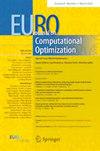具有无界半连续变量的混合整数问题的潜水启发式
IF 2.6
Q2 OPERATIONS RESEARCH & MANAGEMENT SCIENCE
引用次数: 0
摘要
半连续决策变量在许多实际应用中自然出现。它们被定义为取零值或指定范围内的任何值,主要是为了防止解中出现小的非零值。在实际模型中,半连续变量可能面临的一个特殊挑战是,它们的上界可能很大,甚至是无限的。在本文中,我们简要地讨论了这些挑战,并提出了一种针对一般半连续变量的混合整数优化问题的新的潜水启发式算法。启发式被设计为独立于半连续变量是否从上面有界工作,从而规避了无界半连续变量带来的特定困难。我们在三个不同的测试集上进行了大量的计算实验,并将启发式算法集成到一个开源的MIP求解器中。结果表明,这种启发式方法是在可忽略不计的时间内找到高质量解的成功工具。在根节点,原始间隙平均减少了5%到21%,考虑到整体性能的提高,原始积分平均减少了2%到17%。本文章由计算机程序翻译,如有差异,请以英文原文为准。
A diving heuristic for mixed-integer problems with unbounded semi-continuous variables
Semi-continuous decision variables arise naturally in many real-world applications. They are defined to take either value zero or any value within a specified range, and occur mainly to prevent small nonzero values in the solution. One particular challenge that can come with semi-continuous variables in practical models is that their upper bound may be large or even infinite. In this article, we briefly discuss these challenges, and present a new diving heuristic tailored for mixed-integer optimization problems with general semi-continuous variables. The heuristic is designed to work independently of whether the semi-continuous variables are bounded from above, and thus circumvents the specific difficulties that come with unbounded semi-continuous variables. We conduct extensive computational experiments on three different test sets, integrating the heuristic in an open-source MIP solver. The results indicate that this heuristic is a successful tool for finding high-quality solutions in negligible time. At the root node the primal gap is reduced by an average of 5% up to 21%, and considering the overall performance improvement, the primal integral is reduced by 2% to 17% on average.
求助全文
通过发布文献求助,成功后即可免费获取论文全文。
去求助
来源期刊

EURO Journal on Computational Optimization
OPERATIONS RESEARCH & MANAGEMENT SCIENCE-
CiteScore
3.50
自引率
0.00%
发文量
28
审稿时长
60 days
期刊介绍:
The aim of this journal is to contribute to the many areas in which Operations Research and Computer Science are tightly connected with each other. More precisely, the common element in all contributions to this journal is the use of computers for the solution of optimization problems. Both methodological contributions and innovative applications are considered, but validation through convincing computational experiments is desirable. The journal publishes three types of articles (i) research articles, (ii) tutorials, and (iii) surveys. A research article presents original methodological contributions. A tutorial provides an introduction to an advanced topic designed to ease the use of the relevant methodology. A survey provides a wide overview of a given subject by summarizing and organizing research results.
 求助内容:
求助内容: 应助结果提醒方式:
应助结果提醒方式:


